Brazilian startup RadarFit uses AI to incentivize healthy habits (original) (raw)
Adriemilly Rigo wasn’t feeling well. “To tell you the truth, I was very sedentary, I didn’t practice sports much, and I didn’t take care of myself very well,” she says.
She had gained weight, felt fatigued and developed chronic migraines. Then her doctor told her she had fatty liver disease, a serious metabolic condition that if left untreated can lead to liver failure.
Rigo was scared. So, when her supervisor asked her if she wanted to try out a new health and wellness app offered by their company, she signed up. After following the healthy meal advice and starting an exercise program, her symptoms are under control, and she is feeling better than she has in ages. “It’s been wonderful for me,” says Rigo. “Now I challenge myself more and more every day.”
Rigo is prioritizing her health with help from a generative AI-powered app called RadarFit. Launched in 2020 by a trio of female entrepreneurs, the Brazilian tech startup has already amassed more than one million users with a unique gamification strategy designed to incentivize healthy habits.
While it serves individuals, too, RadarFit’s focus is providing a comprehensive health and wellness program to corporate customers. “For companies, we solve the problem of high costs from employee health problems and having to invest a lot in health benefits,” says Chief Executive Officer Jade Utsch Filizzola.
Like many countries experiencing rapid urbanization, Brazil is grappling with high rates of heart disease and metabolic conditions, such as diabetes and non-alcoholic fatty liver disease, also known as steatohepatitis. The prevalence of non-alcoholic fatty liver disease (NAFLD) in Brazil is estimated to be around 35.3 percent, the highest in Latin America, compared to 25 percent worldwide, according to the Global Burden of Disease database. While costly to treat and potentially deadly, many chronic conditions, including NAFLD, can be prevented – or even reversed – with proper diet and exercise, according to the Journal of Hepatology. That’s one reason why more companies like Rigo’s have signed up for RadarFit. In a few short years RadarFit has enrolled over 60 corporate customers – and is on track to have 80 commercial clients by the end of this year.
Powered by the Microsoft Cloud, RadarFit runs on Microsoft’s Azure OpenAI Service and uses Microsoft Copilot Studio to automate marketing, and analyze data and user feedback.
The impact of RadarFit on the health of employees has “been a big surprise to us,” says Samuel Lopes Fontes, who oversees finance and HR at Cooabriel, Rigo’s employer. Under persistent but friendly prompting from the RadarFit app, says Lopes Fontes, “people who claimed they didn’t have time to go to the gym started exercising and waking up earlier so they can take care of themselves.” In another turnaround, colleagues are asking the company to stock more fresh fruit and vegetables in the employee kitchen.
Two years ago, 27 of Cooabriel’s 470 employees signed up for RadarFit. Now as word has spread, 59 are taking part, and in the first six months of this year, health complaints have fallen by half, says Lopes Fontes.
Prompted by RadarFit’s AI-generated app, Lopes Fontes, who, like Rigo, also developed fatty liver disease (although his was caught much earlier) improved his diet, started running more and says his doctor has since declared his disease in remission.
Of course, there are thousands of apps and websites dishing out health and wellness advice, and many more millions of people who aspire to live healthier lifestyles but fail to follow through.
That’s where gamification comes into play. “The root cause of the difficulty of achieving a healthy life is the lack of immediate results,” says Filizzola. Even if a person puts in 60 minutes of exercise or eats a healthy meal, “they don’t instantly get the health and body they want,” she says. “This lack of immediate reward is what triggers the lack of motivation.”
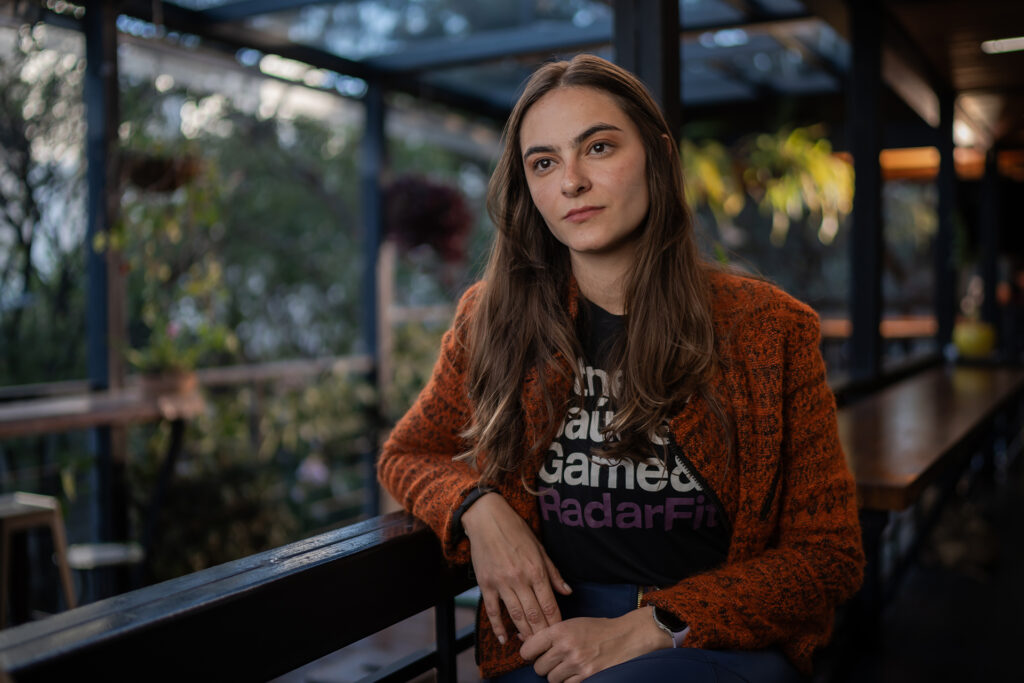
“For companies, we solve the problem of high costs from employee health problems and having to invest a lot in health benefits,” says Jade Utsch Filizzola, Chief Executive Officer of Brazil’s RadarFit. Photo by Avener Prado.
So RadarFit uses generative AI, combined with a points system, to incentivize healthier choices. Anonymized user data captured from the uploaded images of meals and other activities is used to generate “tags” – or labels – that generate personalized recommendations based on each healthy habit registered by users. An avatar that “learns” from user input recommends meals and physical activity tailored to individual health goals. Points awarded for healthy choices can be exchanged for donations to social or environmental causes or redeemed for products like appliances and electronics.
Different point categories recognize that some tasks are more difficult than others. For example, a 15-minute workout earns 3 points, while a 60-minute or longer workout can be worth 9 points. A healthy meal can earn 31 points, highlighting the importance of healthy eating, while tasks like drinking a glass of water, an important but easier task, earns 5 points.
The RadarFit app also allows users to track their progress compared to colleagues, the kind of friendly competition that research has shown can act as a further spur to action (and is familiar to anyone who has practiced more after comparing their scores to other learners on popular language apps). Users can also opt out of company competitions.
RadarFit Chief Technology Officer Tatiany Duarte, who designed her first video game at age 15, says combining generative AI with gamification turns what could be a dreaded task into something fun and engaging. It “makes it much more playful,” she says.
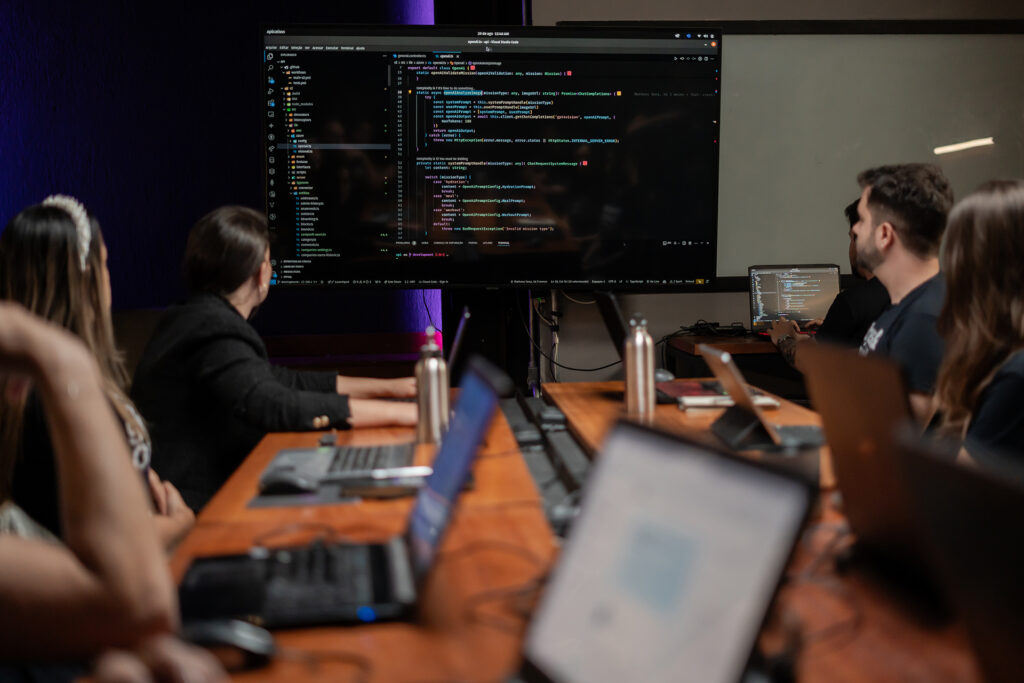
Launched in 2020 by a trio of female entrepreneurs, the Brazilian tech startup has already amassed more than one million users with a unique AI-powered gamification strategy designed to incentivize healthy habits. “Artificial intelligence allows us to do a lot with a lean team,” says CEO Filizzola. Photo by Avener Prado.
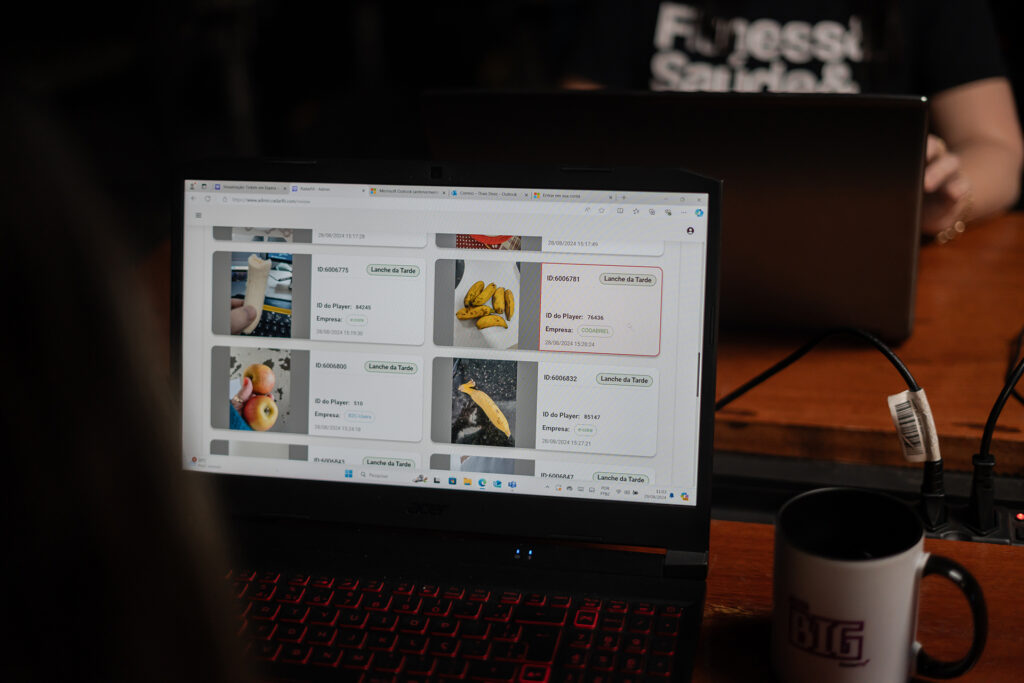
Users earn points that can be redeemed for prizes by uploading photos of healthy meals which are reviewed by AI with oversight by RadarFit’s stable of human subject-matter experts. Photo by Avener Prado.
Corporate clients get a single dashboard of detailed employee data that measures activity across four key metrics – healthy eating, hydration, meditation and physical activity. Importantly, all information presented on the dashboard is anonymous and aggregated. While user data is used locally to personalize the user experience, all data is processed in an encrypted manner to ensure security and privacy. Users are also notified that their data is anonymized during the registration process and in the terms of use and privacy policy.
Companies have access to an overview of trends and behaviors among their employees but do not receive information that identifies specific individuals. For example, the dashboard might show that 70 percent of employees met their hydration goals last week, but it will not reveal who specifically did or did not meet those goals. This employee data also allows Human Resources departments to measure the return on their investment in their employees wellbeing while also monitoring, on a macro level, how gamification is impacting employees’ health.
Before RadarFit, says Filizzola, companies seeking a comprehensive health and wellness approach for their employees had to administer multiple programs, each with their own metrics and associated costs.
By organizing multiple activities under one umbrella, “we unify the solution through technology,” says Filizzola.
The three women say their original idea for RadarFit grew out of their own struggles to find time to take care of themselves while also building a business. Filizzola and Chief Financial Officer Jennifer Faria met in college, where both took business classes focused on entrepreneurship. Duarte, the CTO, inherited her interest in entrepreneurship from her family and sold her first business just before she was approached by Filizzola to help build out RadarFit’s technology infrastructure.
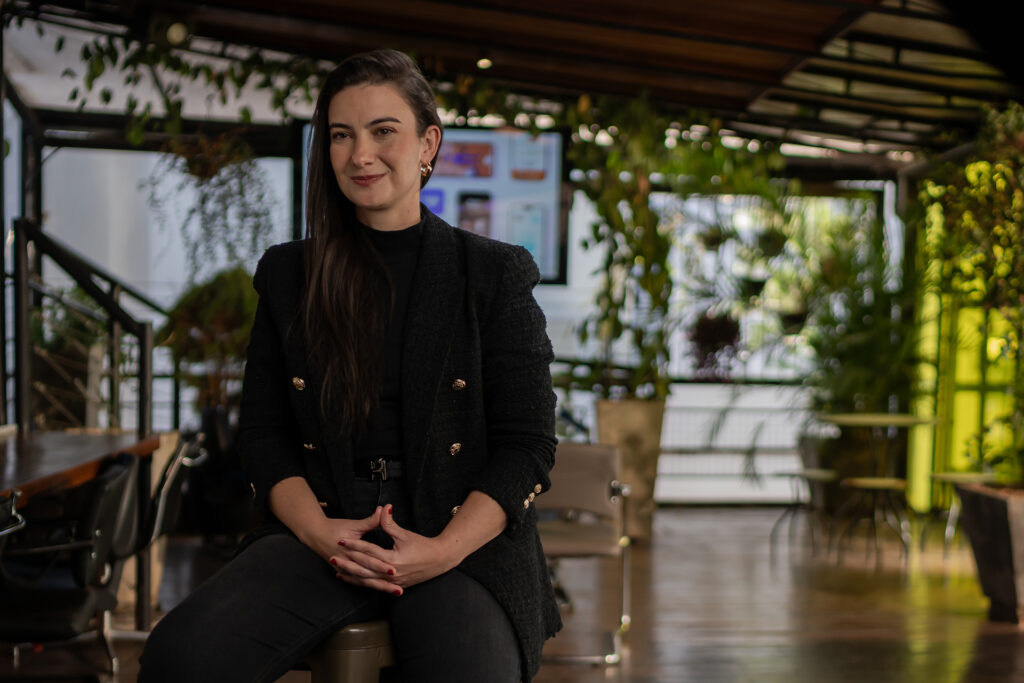
Combining generative AI with gamification turns what could be a dreaded task into something “much more playful” says Tatiany Duarte, Chief Technology Officer of RadarFit. Photo by Avener Prado.
The women-helmed start-up got a big lift last year from Women Entrepreneurship (WE), an initiative of Microsoft’s Brazilian subsidiary, which includes eight other corporate funders and provides capital, consulting and mentorship to encourage more women to start businesses.
In November 2023, RadarFit received more than 2.5 million reais from WE Ventures (roughly equivalent to about $456,000 USD). The startup invested the funds to improve functionality and accelerate expansion outside Brazil. Using Azure OpenAI Studio and Copilot Studio, RadarFit has also added a guided meditation feature designed to relieve fatigue, stress and insomnia by prompting users to take time out for breathing exercises or reciting mantras designed to calm the mind.
Like any startup, RadarFit has had its share of growing pains.
Their first idea, an online marketplace for health and wellness products, went nowhere, but the co-founders remained interested in the health space. The seed of the idea that became RadarFit began to germinate when they recruited about 5,000 friends and family to trade wellness advice and encouragement over WhatsApp. The community approach got traction but was impossible to scale. With Duarte on board, they were finally able to focus on developing a tech strategy that would enable them to develop their offerings and sign up more customers in a sustainable way.
In its early launch days, RadarFit relied heavily on a stable of human experts – including a physician, nutritionist, physical therapist and psychologist – to review and validate user-reported progress, says RadarFit CFO Faria.
To earn points, users are required to upload photos of meals and physical activities that document their progress. Initially, each image was manually reviewed to calculate nutritional value and estimate calories burned or steps taken. Soon, thousands of users were uploading pictures – and RadarFit’s human reviewers were swamped. Early AI technology helped ease the backlog but fell short of expectations.
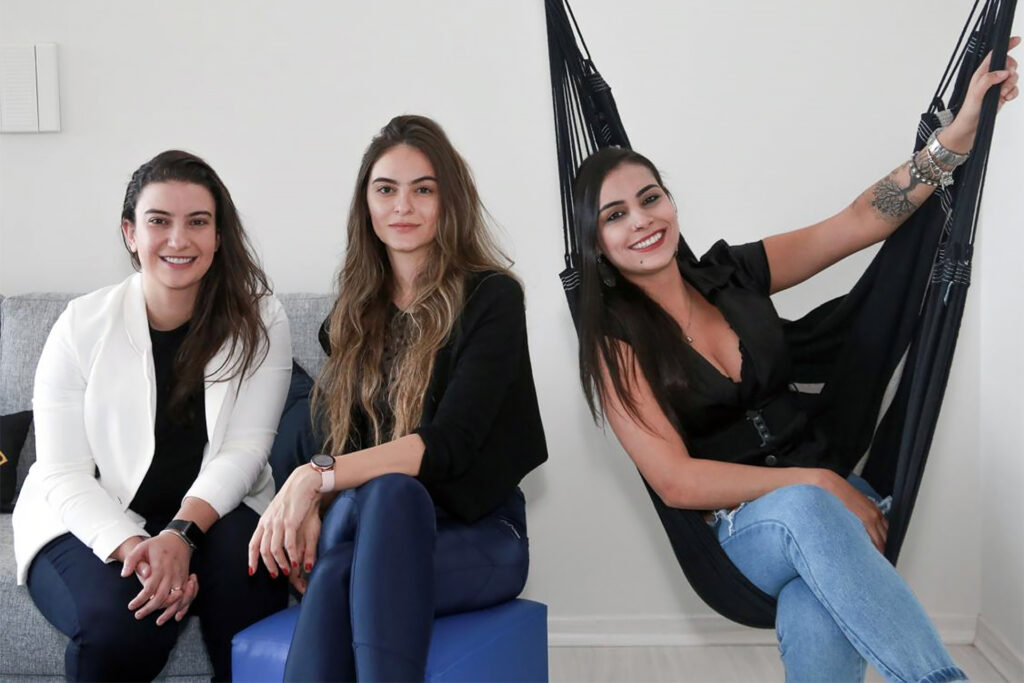
The three founders say their original idea for RadarFit grew out of their own struggles to find time to take care of themselves while also building a business. They took this photo together a little after they kicked off their startup. From left to right: Tatiany Duarte, Chief Technology Officer, Jade Utsch Filizzola, Chief Executive Officer, and Jennifer Faria, Chief Financial Officer. Photo by RadarFit.
Last year, RadarFit migrated their platform to Azure OpenAI Service and OpenAI GPT-4, which Duarte says is critical to advanced analysis of meals. To fully automate meal and exercise reviews under the supervision of RadarFit’s subject matter experts, they also deployed Microsoft’s Azure AI Vision image recognition software. The new AI-powered system sped up the review and reward process – and removed a temptation familiar to any dieter: cheating. In their zeal to win prizes, some users lifted images from the Internet and uploaded them in place of their actual meals or activities. Now, RadarFit’s AI-powered app automatically rejects screen shots of meals that clearly did not originate with the user.
“Artificial intelligence allows us to do a lot with a lean team,” says Filizzola.
RadarFit also uses Copilot Studio to further personalize the user experience. Once a user inputs their health goals, detailed suggestions and information are delivered in conversational language through the RadarFit avatar. For example, someone who enjoys outdoor activities might receive a notification suggesting they go for a walk or bike ride.
Filizzola believes AI will allow RadarFit to become increasingly capable as more people sign up and share their health goals and progress. “Now that we have a large base of users,” she says, “we can access this data to analyze behavior and further improve the user experience.”
Lopes Fontes says he noticed the improvement in functionality after the AI upgrade, and decided it was time to give meditation a try. “I’d seen people do it in the movies, but I had never meditated before and had no idea how to do it,” he says. But once he followed the RadarFit prompts and got into a routine, he was hooked. Now he carves time out every morning to practice. If an unexpected work or family obligation prevents him from doing his breathwork, Lopes Fontes says, “I really miss it.”
Top image: Tatiany Duarte, RadarFit’s Chief Technology Officer, and Jade Utsch Filizzola, Chief Executive Officer. Photo by Avener Prado.